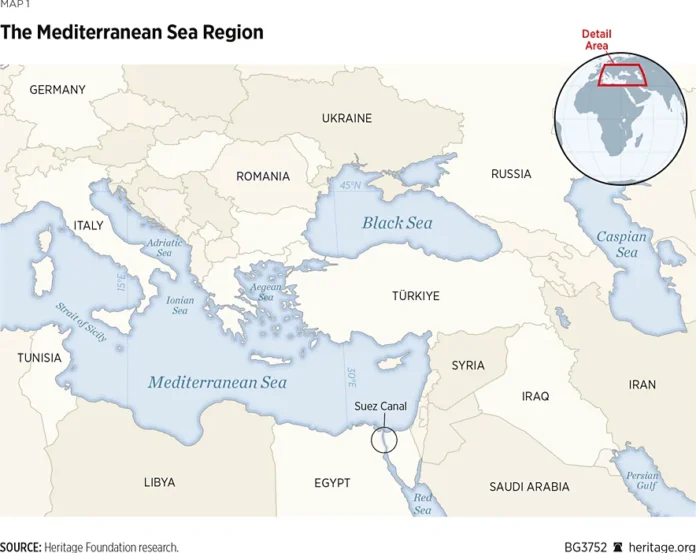Authors:Brent Sadler, James Di Pane, Nicole Robinson and Janae Diaz
SUMMARY
KEY TAKEAWAYS
U.S. action is needed urgently in the Greater Mediterranean to grow the space for free, secure, and resilient commerce.
The United States should leverage its network of partner nations and alliances.
Supporting maritime security capacities in the wider eastern Mediterranean region will best address the myriad national interests of U.S. partners in the region.
Iran, Russia, and China continue to expand their influence in Europe, a region critical to transatlantic security and U.S. interests. America is beneficiary of a Europe whole, free, prosperous, and peaceful. To this end, expanding stability in Eurasia, the Middle East, and North Africa is important. To achieve this, U.S. action is needed urgently in the Greater Mediterranean to grow the space for free, secure, and resilient commerce that enables security and diplomatic cooperation.
Currently, U.S. efforts in the region are not commensurate with America’s interests: European energy resiliency, a secure Black Sea, and freedom from the destabilizing scourge of a range of illicit maritime activities. The United States can accomplish a great deal more through security cooperation, burden-sharing, and joint action. The United States should leverage its network of partner nations and alliances, a joint capability that China, Russia, and Iran cannot match.
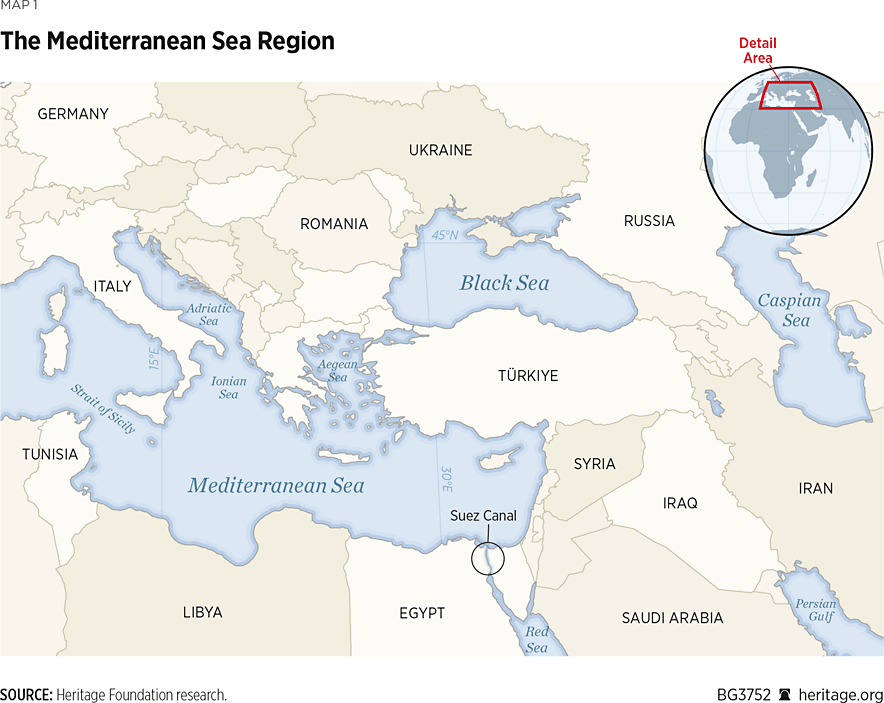
Why the Eastern Mediterranean Matters
The wider eastern Mediterranean sits at an important crossroads, straddling Europe, the Middle East, North Africa, and Asia. Many important oil and gas pipelines, shipping routes, and fiber-optic cables crisscross the region throttled at two strategic chokepoints: the Suez Canal and the Turkish Straits.
Strengthening alliances that benefit U.S. interests is important. Burden-sharing requires not just demanding allies do more but making an equitable contribution as well and sharing responsibilities, risks, and rewards of effective security cooperation. America has treaty obligations under NATO to Black Sea nations Bulgaria, Romania, and Türkiye. In addition, America’s biggest European geopolitical competitor, Russia, is at war with Ukraine and remains a threat undermining U.S. interests across the wider region.
The following dangers and concerns put this crossroads at risk.
Russia. For Moscow, the wider eastern Mediterranean presents opportunities to expand and protect its southern flank while also challenging the United States and its allies. The Kremlin’s strategic objectives in each maritime subregion, however, are different. On the one hand, in the Black Sea and Caspian Sea, Russia aims to maintain its status as the dominant power and prevent NATO and Western powers from gaining a foothold. In the eastern Mediterranean, the goal is to expand its presence to undermine the military alliance NATO and fragment the economic coherence of the European Union.
China. Beijing seeks to exploit Russian and Western competition and engage where it can while furthering economic and military interests via its Belt and Road Initiative. China is on track to dedicate over $1 trillion by 2027 to developing the seaborne element of the Belt and Road, its Maritime Silk Road, beginning in Southern China and ending in Europe.1
Andrew Chatzky and James McBride, “China’s Massive Belt and Road Initiative,” Council on Foreign Relations, last updated January 28, 2020, https://www.cfr.org/backgrounder/chinas-massive-belt-and-road-initiative (accessed January 29, 2023).
Investments aim to improve connectivity and cooperation across the region through improved infrastructure and industrial development. Port infrastructure has been a particular focus for China, with investments in the Greek port of Piraeus, now a majority stakeholder, and other efforts to gain footholds in Israel, Italy, Germany, and many more countries across the region. Maritime port access in strategic trade nodes will ultimately give China strategic dominance. This is done through control of the port and local political influence without having to fight for naval dominance in each of these subregions. The war in Ukraine, however, gives the United States an opportunity to rethink its engagement in the wider eastern Mediterranean to challenge both Russia as a weakened power and China as a rising power.
Freedom of the Commons. For the United States, freedom of navigation and access drive engagement in the wider eastern Mediterranean. Although each of the maritime subregions present different challenges for U.S. fleets, all are united by a common U.S. goal: to ensure the security and stability of a region that is today anything but secure and stable. Ultimately, Washington should look for opportunities to strengthen the capabilities of its partners and allies in the Black Sea, Caspian Sea, and eastern Mediterranean to deter Russia’s maritime ambitions and protect Europe. The United States has a unique opportunity to contribute to the development of nations that seek to chart their own destiny and integrate with the West absent the oppressive influence of external powers.
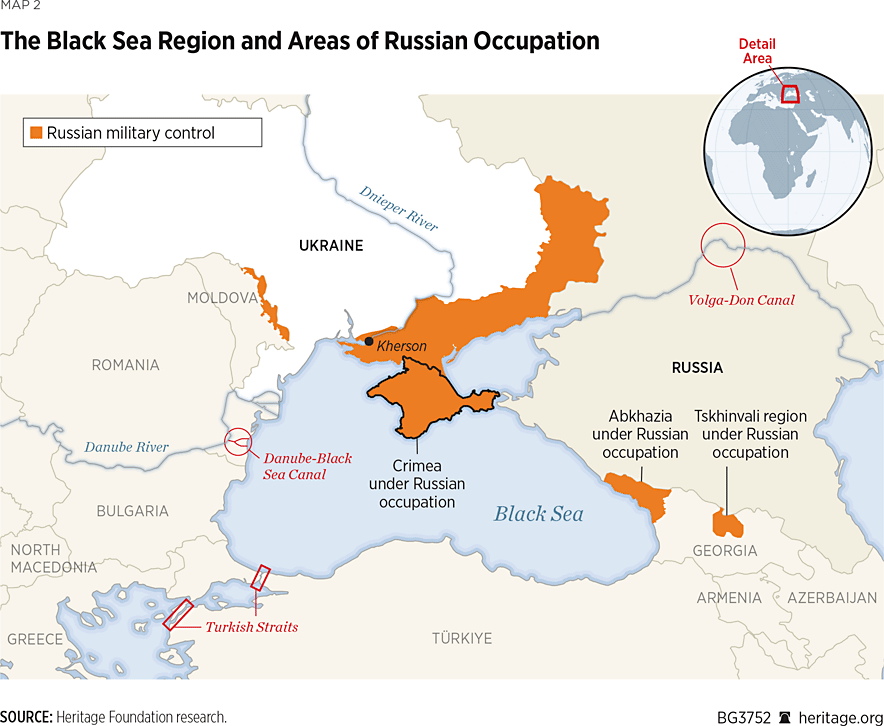
Regional Stability. The Black Sea region has been inherently unstable since the dissolution of the Soviet Union. Complex and unworkable agreements between Russia and Ukraine have not helped, such as the disposition of the remnants of the Soviet Black Sea Fleet. This arrangement spelled out basing and access for Russian naval forces in Sevastopol as well as the division of the Soviet fleet between these two new nations until its dissolution by Russia’s 2014 invasion and annexation of Crimea.2
Agreement between Ukraine and the Russian Federation on the status and conditions of stay of the Black Sea Fleet of the Russian Federation on the territory of Ukraine, May 28, 1997, https://zakon.rada.gov.ua/laws/show/643_076#Text (accessed November 11, 2022).
As the fighting progresses in the current Ukraine–Russia war, a lasting peace will be possible only with a firm and simple resolution of borders, maritime rights, and, importantly, a favorable balance of power with a greatly diminished Russian naval presence. However, Russia’s occupation of Georgia’s Abkhazia and South Ossetia, and its presence in disputed breakaway province Transnistria, gives the Kremlin a basis for future intervention.
Energy Security. Azerbaijan is a potential strategic partner for the United States, because its capital and the largest port on the Caspian Sea, Baku, serves as a transportation hub for goods shipped between Europe and Central Asia.3
James Carafano, “The West Should Welcome the Middle Corridor,” Heritage Foundation Commentary, October 3, 2022, https://www.heritage.org/trade/commentary/the-west-should-welcome-the-middle-corridor.
The nation’s oil and natural gas exports can serve as a significant alternative to Russia for Europe, while greater trade with Europe serves as a counterweight to Iran and Russia.4
Anthony Kim, “Oklahoma National Guard Deepens Strategic Engagement with Azerbaijan,” The Daily Signal, October 26, 2022, https://www.dailysignal.com/2022/10/26/oklahoma-national-guard-deepens-strategic-engagement-with-azerbaijan/.
To achieve this, the current bilateral relationship focusing on counterterrorism and intelligence-sharing will need to broaden to include securing its offshore oil infrastructure.5
Luke Coffey, “Azerbaijan and Armenia: A Regional Conflict with Global Implications,” Heritage Foundation Backgrounder No. 3542, October 6, 2020, https://heritage.org/global-politics/report/azerbaijan-and-armenia-regional-conflict-global-implications.
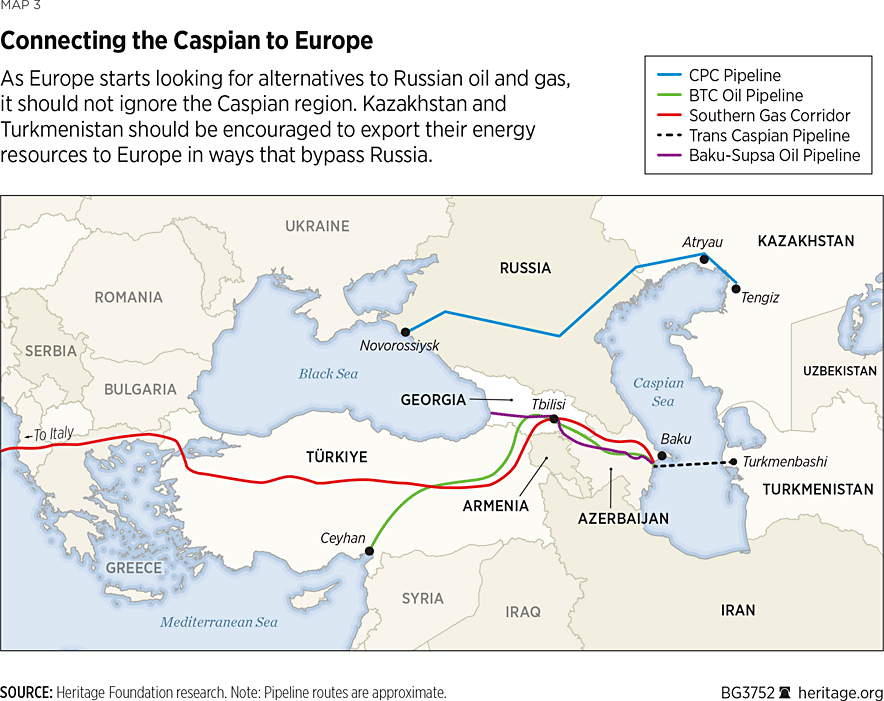
Azerbaijan’s claims in the Caspian Sea include vast hydrocarbons and other natural resources. The Azeri–Chirag–Deepwater Gunashli is Azerbaijan’s largest oilfield, with total production in 2021 averaging 458,000 barrels per day (167 million barrels a year), and the Shah Deniz field is one of the largest gas-condensate fields in the world.6
British Petroleum, “2021 Full-Year Results,” February 10, 2022, https://www.bp.com/en_az/azerbaijan/home/news/business-updates/Full-year-2021-results.html#accordion_1 (accessed January 13, 2023).
According to British Petroleum (BP), in the first half of 2022, Azerbaijan produced about 13 billion standard cubic meters of gas and more than 18 million barrels of crude.7
British Petroleum, “Shah Deniz,” https://www.bp.com/en_az/azerbaijan/home/who-we-are/operationsprojects/shahdeniz.html (accessed December 28, 2022).
For now, the amount of gas delivered to Europe from Azerbaijan is a small percentage of its annual consumption.8
British Petroleum, Statistical Review of World Energy 2022, 71st ed., 2022, p. 31, https://www.bp.com/content/dam/bp/business-sites/en/global/corporate/pdfs/energy-economics/statistical-review/bp-stats-review-2022-full-report.pdf (accessed January 13, 2023).
However, Azerbaijan’s exports are growing. In October 2022, Azerbaijan announced that by 2027, the country will double its natural gas exports to partners in Europe.9
Joseph Hammond, “Azerbaijan’s Response to Russia’s Invasion Has Included Plans for Increased Energy Exports to Europe,” Forbes, October 28, 2022, https://www.forbes.com/sites/zengernews/2022/10/28/azerbaijans-response-to-russias-invasion-has-included-plans-for-increased-energy-exports-to-europe/?sh=366ee2782fc4 (accessed January 29, 2023).
Three of the major oil pipelines that transport Caspian and Central Asia energy travel through Azerbaijan: Baku–Tbilisi–Ceyhan (BTC), Baku–Supsa, and Southern Gas Corridor.10
Anthony Kim, “Why Azerbaijan Merits Greater Strategic Attention from Washington,” The Daily Signal, July 19, 2022, https://www.dailysignal.com/2022/07/19/why-azerbaijan-merits-greater-strategic-attention-from-washington/.
Significantly, Israel also receives 40 percent of oil imports from Azerbaijan via the BTC pipeline and then on ship.11
Tovah Lazaroff, “Azerbaijani Ambassador: Border Hostilities May Harm Israeli Oil Supplies,” Jerusalem Post, July 21, 2020, https://www.jpost.com/israel-news/azerbaijani-ambassador-border-hostilities-may-harm-israeli-oil-supplies-635851 (accessed December 28, 2022).
That said, these pipelines transit dangerous ground, vulnerable to criminal, external, and regional threats. Siphoning and other criminal or destructive efforts are a continual concern. An intricate, successful criminal operation in 2016 was uncovered in neighboring Georgia.12
Eurasianet, “Is This the Most Intricate Oil Theft Operation Yet?,” OilPrice.com, March 23, 2016, http://oilprice.com/Energy/Energy-General/Is-This-The-Most-Intricate-Oil-Theft-Operation-Yet.html (accessed December 28, 2022).
During the October 2020 Nagorno–Karabakh conflict, Azerbaijan reported that its air defense systems intercepted and destroyed missiles near these pipelines.13
Reuters, “BP Works on Reinforcing Security at Azerbaijan Facilities,” October 7, 2020, https://www.reuters.com/article/armenia-azerbaijan-bp-int/bp-works-on-reinforcing-security-at-azerbaijan-facilities-idUSKBN26S27U (accessed February 28, 2023); Kama Mustafayeva, “Azerbaijan ‘Thwarts Rocket Assault’ on Oil and Gas Export Pipelines,” Upstream, October 7, 2020, https://www.upstreamonline.com/politics/azerbaijan-thwarts-rocket-assault-on-oil-and-gas-export-pipelines/2-1-889154 (accessed December 22, 2022).
From March through June 2022, BP closed the Baku–Supsa pipeline due to the Ukraine war disrupting commercial tankers collecting Azerbaijani crude at Supsa, located on Georgia’s coast of the Black Sea. Exports were rerouted to ship through BTC pipeline on Türkiye’s Mediterranean coast.14
David O’Bryne, “Ukraine War Forces Closure of Azerbaijani Oil Export Pipeline,” Eurasianet, June 6, 2022, https://eurasianet.org/ukraine-war-forces-closure-of-azerbaijani-oil-export-pipeline (accessed December 27, 2022).
Another constant consideration is Russia’s creeping occupation in Georgia. In 2015, Russian border guards extended the border of South Ossetia in Georgia, putting Russia and pro-Russia South Ossetia in control of a mile-long stretch of the Baku–Supsa pipeline.15
Luke Coffey, “NATO Membership for Georgia: In U.S. and European Interest,” Heritage Foundation Special Report No. 199, January 29, 2018, https://www.heritage.org/defense/report/nato-membership-georgia-us-and-european-interest.
Through its presence in South Ossetia, Russia has the ability to threaten the Southern Gas Corridor. In order for these pipelines to serve as an alternative energy supply to Europe, Azerbaijan and its neighbors must have the capacity to secure overland and undersea pipelines as well as offshore Caspian Sea oil facilities.
Illicit Maritime Activity. Despite United Nations arms embargoes on Libya, 11 years of civil war there has created a permissive environment for smuggling of illicit arms, migrants, and narcotics.16
Countries such as Egypt, Jordan, Russia, Türkiye, Qatar, and the United Arab Emirates have all been accused of supplying weapons to various factions within Libya, fueling the conflict.
A U.N. report released in March 2021 detailed dozens of arms shipments over a period of October 2019 to January 2021, including drones, surface-to-air missiles, artillery, and armored vehicles, as well as the deployment of mercenaries—including Russians, Syrians, Sudanese, and Chadians via disguised airlines and merchant vessels operating in eastern Mediterranean waters.17
Samy Magdy, “UN Report Documents Mass Violations of Libyan Arms Embargo,” AP News, March 18, 2021, https://apnews.com/article/africa-libya-middle-east-north-africa-united-nations-d7418ac4d2bf98ecf4bc2654c5008e65 (accessed December 19, 2022).
Although a cease-fire was declared in 2020 between the warring parties in Libya, the U.N.-sponsored peace process has not yet led to presidential elections, and ongoing tensions among rival factions could push the country back into civil war at any time.
In addition, narcotics trafficking is a persistent threat in the eastern Mediterranean. Record amounts of Captagon—an amphetamine-type illicit stimulant—have been seized in the Middle East and increasingly in Europe. From 2017 to January 2022, 10 Captagon shipments were seized in European ports or airports.18
Caroline Rose and Alexander Söderholm, “The Captagon: A Profile of Illicit Trade, Consumption, and Regional Realities,” New Lines Institute, April 2022, https://newlinesinstitute.org/wp-content/uploads/20220404-Captagon_Report-NLISAP-final-.pdf (accessed December 22, 2022).
In 2020, Italian customs officials seized 84 million pills in the port of Salerno, the largest seizure at the time. Greek authorities have also seized several large shipments of Captagon. All of these shipments have originated from the port of Latakia in Syria, which is controlled by the Assad regime.19
The Jerusalem Post, “New Report Documents How Syrian Drug Trade Flowed Through Italy,” July 21, 2022, https://www.jpost.com/middle-east/article-712669 (accessed December 6, 2022).
This evidence, in addition to other investigative reports, tie the $10 billion Captagon drug trade to the Assad regime in Syria and Hezbollah in Lebanon.20
Nicole Robinson and Rafi Levitt, “Captive to Captagon,” The Daily Signal, April 12, 2022, https://www.dailysignal.com/2022/04/12/captive-to-captagon-how-a-narcotic-has-become-scourge-of-middle-east/.
Saudi Arabia, Jordan, and other Arab countries are attempting to disrupt overland smuggling routes of Captagon in the Middle East, but less understood is smuggling done out of Latakia. As land routes become more scrutinized, smugglers may explore alternative routes over sea.
Immigration. Dealing with this challenge is already an established priority for the EU and, specifically, for the European countries in the region bearing the brunt of illegal migrant flows.21
Catherine Wihtol de Wenden, “Migrations in the Mediterranean Region,” European Institute of the Mediterranean, 2015, https://www.iemed.org/publication/migrations-in-the-mediterranean-region/ (accessed February 22, 2023).
Moreover, the deteriorating economic conditions in Africa and the prospect of additional conflict has increased the flow of migration to historic levels. In 2022, over 90,000 migrants and refugees have crossed the Mediterranean to make their way to Europe, a 50 percent increase. If unchecked, the refugee crisis could once again be weaponized by Russia and its partners to undermine European unity, as was the case in the fall of 2021, when Belarussian President Alexander Lukashenko used vulnerable refugees from various countries in the Middle East as bargaining chips to pressure the EU to lift sanctions.
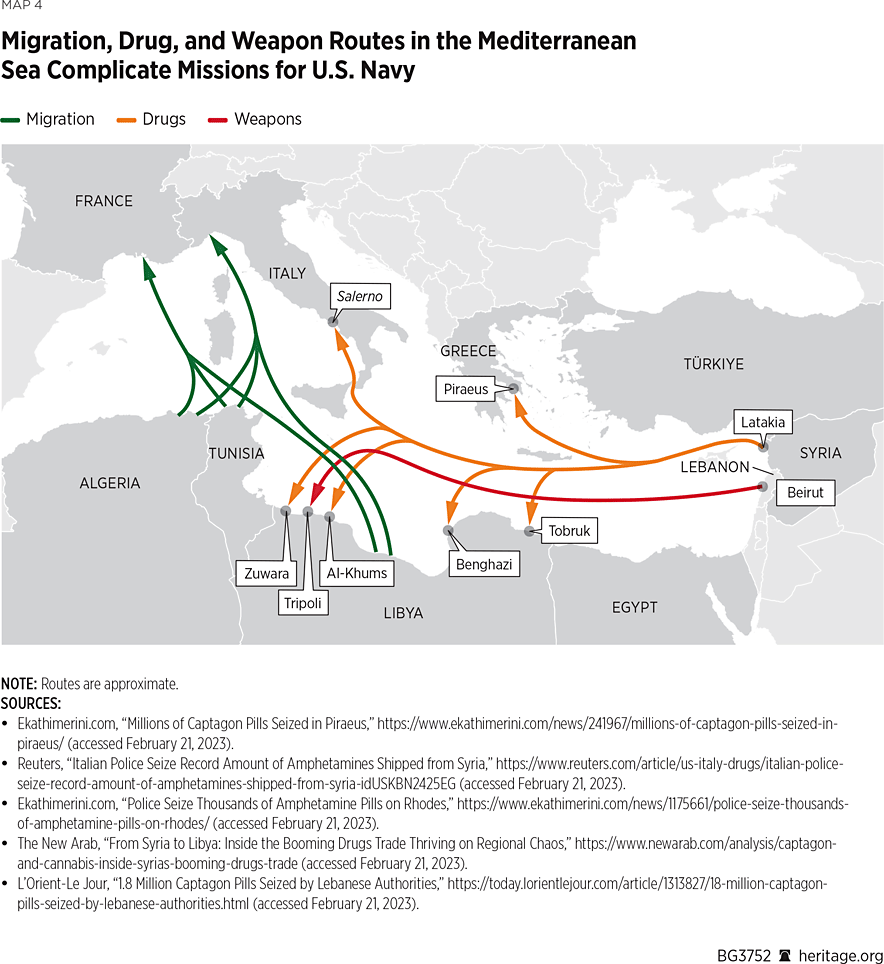
Challenges to Progress
Multinational cooperation and burden-sharing have demonstrated some success, but they are inadequate to the scope of interests to be protected.
In 2021, for instance, the U.S. Coast Guard conducted training with the Italian navy to enhance economic stability and increase operational interoperability.22
USCGC Hamilton Public Affairs, “U.S. Coast Guard Strengthens Trans-Atlantic Ties with Italy,” April 26, 2021, https://www.navy.mil/Press-Office/News-Stories/Article/2584443/us-coast-guard-strengthens-trans-atlantic-ties-with-italy/ (accessed February 22, 2023).
Such exercises are conducted by U.S. Sixth Fleet, based in Naples, Italy. This effort supports NATO and EU activities in the eastern Mediterranean, notably the Mediterranean Dialogue, Operation Sea Guardian, and Operation EUNAVFOR MED IRINI.
The Mediterranean Dialogue brings together NATO members with Algeria, Egypt, Israel, Jordan, Mauritania, Morocco, and Tunisia yearly in bilateral and multilateral settings to discuss security issues and identify activities for cooperation. This has fostered a regional consensus among participants.23
NATO, “Mediterranean Dialogue,” June 23, 2022, https://www.nato.int/cps/en/natohq/topics_52927.htm (accessed February 22, 2023).
Operation Sea Guardian is a multinational NATO-led surface, undersea, and aerial initiative that began in 2016 to interrupt the flow of arms and terrorism between the Middle East and North Africa and Europe.24
The effort has seen the formation of a “hub for maritime security information sharing” among member-states, furthering freedom of navigation. For more information, see NATO, “Operation Sea Guardian,” updated May 17, 2021, https://www.nato.int/cps/en/natohq/topics_136233.htm (accessed December 2, 2022).
Despite some successes, the operation remains underutilized. It is classified as a “non-Article 5” operation, so the forces have no authority to interdict illicit maritime activity.25
Ibid.
The EU’s Operation EUNAVFOR MED IRINI enforces U.N. embargoes, interdicting ships suspected of smuggling weapons into Libya. IRINI’s efforts at improving Libyan maritime security capacity has in recent years also had success in countering migrant flows. IRINI, however, lacks the authority and capacity to fully implement mission requirements.
Moreover, inter-regional disputes complicate region-wide U.S. approaches. These disputes involve several allied countries and regional partners. Turkish and Greek relations, for instance, are at an all-time low. U.S. regional partners have distinctly diverging interests in Libya. France, Egypt, Israel, and others have economically and politically partnered on a range of energy deals and joint-military exercises in contested waters.26
Ismail Numan Telci, “Why the Eastern Mediterranean Is of Strategic Importance for Turkey,” Politics Today, May 13, 2019, https://politicstoday.org/why-the-eastern-mediterranean-is-of-strategic-importance-for-Turkey (accessed December 22, 2022).
Meanwhile, there is a genuine lack of joint effort and common vision for improving stability in the western Balkans.
Migration is a particularly divisive issue among European allies. Since Italian national elections in September 2022, the issue has once again become a bilateral flashpoint between Italy and France. Although the EU is looking to spend $594 million in the next two years to support North African economies to stem migration, Italy’s new prime minister, Giorgia Meloni, has called for the EU to do more to defend its borders. In early November 2022, Meloni’s government barred a non-governmental vessel from docking with 230 migrants in Italy, instead directing the ship to France. This action infuriated Paris, which shortly afterward froze plans to take in 3,500 migrants from Italy as part of a European redistribution deal. Instead, Paris announced that it would fortify the border with Italy to prevent future migrant crossings.27
Alys Davies, “France Suspends Migrant Deal with Italy over Boat Row,” BBC News, November 10, 2022, https://www.bbc.com/news/world-europe-63582122 (accessed December 6, 2022).
The European Commission has tried to mediate, but the two heads of state at the time of this publication have not shown any signs of reconciliation.
In addition, recent natural gas discoveries in the eastern Mediterranean fueled interregional disputes. In the past few years, Egypt, Europe, Israel, Türkiye, and others have raced to lay claim to over 122 trillion cubic feet of gas and 1.7 billion barrels of oil discovered in the eastern Mediterranean Sea. In 2019, Cyprus, Greece, and Israel established the Eastern Mediterranean Gas Forum, a coordination body that will facilitate the development of an Eastern Mediterranean Pipeline to bring energy to Europe. Egypt and Jordan were included in the forum, but, notably, Türkiye was excluded.28
Geoffrey Aronson, “Conflict Expands in Eastern Mediterranean over Gas Riches,” Arab Weekly, January 19, 2020, https://thearabweekly.com/conflict-expands-eastern-mediterranean-over-gas-riches (accessed December 21, 2022).
As a result, Ankara forged ahead with its own energy exploration, signing deals with Libya’s U.N.-recognized Government of National Accord and sent out exploration vessels in contested waters surrounding Cyprus.29
Federica Marsi, “Turkey Resumes Gas Exploration in the Eastern Mediterranean,” Al-Jazeera, August 9, 2022, https://www.aljazeera.com/news/2022/8/9/Turkey-resumes-gas-exploration-in-the-eastern-mediterranean (accessed December 20, 2022).
The small island country is a point of contention between Greece and Türkiye, with sizable Greek and Turkish Cypriot populations. The long-simmering dispute over the divided island is now bleeding over into maritime disputes involving significant energy reserves. Added to this are renewed efforts by the Meloni government to pen energy deals like that recently agreed with Algeria to make Italy an energy hub for the region.30
Allan Kaval, “Giorgia Meloni Launches Her Mediterranean Policy in Algiers,” Le Monde, January 24, 2023, https://www.lemonde.fr/en/international/article/2023/01/24/giorgia-meloni-launches-her-mediterranean-policy-in-algiers_6012947_4.html (accessed February 1, 2023).
Overall, energy competition is becoming a zero-sum game among regional allies.
The United States has the partnerships and capacity to overcome the challenges impending joint action, achieving much better outcomes for the United States and its partners and allies by enhancing security cooperation and making burden-sharing much more effective and resilient.
Recommendations
Congress has considered notable legislation to improve the U.S. contribution to Black Sea security and stability.31
Seth Cropsy, “The U.S. Needs a Black Sea Strategy,” Barron’s, February 2, 2023, https://www.barrons.com/articles/black-sea-strategy-russia-ukraine-security-51675363906 (accessed February 22, 2023).
This effort is laudable and should be supplemented with a broader array of security cooperation initiatives to ensure that U.S. actions match the level of U.S. interests. The U.S. should:
- Enhance security cooperation with Georgia. The United States should enhance bilateral relations with Georgia.32
Alexis Mrachek, “Top Five Priorities for the U.S.–Georgian Relationship in 2020,” Heritage Foundation Issue Brief No. 5033, January 31, 2020, https://www.heritage.org/global-politics/report/top-five-priorities-the-us-georgian-relationship-2020.
In particular, bolstering Georgia’s naval forces would ensure a more favorable military balance in the Black Sea. Georgia has built a coast guard with former U.S. Coast Guard ships. However, the United States will need to work closely with Tbilisi to develop a maritime security capacity that complements wider regional efforts. One way to achieve this is by establishing a NATO-certified Center of Excellence for maritime security to provide meaningful maritime security planning and training. The center could also include Ukraine and Moldova.
- Enhance security cooperation with Azerbaijan. The United States should increase opportunities for foreign military sales to Azerbaijan to build out the country’s maritime and air security capacity. In 2020, United States Marine, Inc., based in Mississippi, was awarded a $7.5 million order to the government of Azerbaijan for 15.9-meter Explosive Ordnance Disposal multi-use response watercraft. The United States should expand such efforts.
- Reduce post-conflict residual Russian Black Sea naval presence. In any post-conflict negotiations between Russia and Ukraine, the United States should propose a reduction of Russian presence in the Black Sea below pre-conflict levels. The goal is to ensure that Russia cannot recapitalize its Black Sea navy to threaten Ukraine or any Black Sea state in the future.
- Assist allies and partners in developing anti-submarine warfare. The anti-submarine rocket (ASROC) system was developed during the Cold War and is employed by numerous allied navies for shipboard use with a range of 10 miles.33
U.S. Navy, “Vertical Launch Anti-Submarine Rocket ASROC (VLA) Missile,” August 31, 2021, https://www.navy.mil/Resources/Fact-Files/Display-FactFiles/Article/2169310/vertical-launch-anti-submarine-rocket-asroc-vla-missile/ (accessed November 11, 2022).
One novel concept is using shore-based rocket-propelled torpedoes by using repurposed naval ASROC systems and unmanned platforms. This effort would be in addition to naval ships, aircraft, and land-based assets capable of supporting anti-submarine missions.
- Establish a standing sea-lane protection task force in the Black Sea. By pooling NATO member minesweeping capabilities, it is possible to form a standing Black Sea task force to ensure that NATO member waters remain free of mines and open to commerce. Germany’s assistance would be significant as a Danubian state. According to Article 30 of the 1948 Convention Regarding the Regime of Navigation on the Danube, only Danubian countries may operate naval vessels in the river (or, if outside their national borders, then with permission of the relevant Danubian state, which could be problematic since it requires consent from Russia-leaning Serbia).34
Danube Commission, “Convention Regarding the Regime of Navigation on the Danube,” August 18, 1948, http://www.danubecommission.org/uploads/doc/convention-en.pdf (accessed November 10, 2022).
As such a state, Germany’s minesweepers could conceivably be less constrained in supporting counter-mining operations in the Black Sea. Such an effort would mirror NATO’s current two Standing Naval Mine Countermeasure Groups.
- Propose and host a maritime risk-reduction consultative body between Greece and Türkiye. This would augment existing bilateral efforts between these two allies such as the third working meeting held in Athens in February 2022. The United States should reach out to Greece and Türkiye to aid in resolving key maritime issues that Ankara feels the West is ignoring. At the same time, Washington should reaffirm that efforts by any side to unilaterally change borders would be unacceptable.
- Support resolving the migration dispute between France and Italy. Although the EU already negotiated a redistribution deal to address migrant resettlement, France and Italy are not on the same page. Italy has claimed that the quota system is not working and that the borders need to be better fortified. France claims that Italy is failing to respect the law of the sea by turning away migrant vessels. The United States should work with both countries to resolve the dispute and work toward a better policy for migrants and asylum seekers.
- Support shared maritime policing in the central and eastern corridors of the eastern Mediterranean. Intelligence-sharing and coordination to combat migration and weapons smuggling should build on existing bilateral information-sharing mechanisms between the EU and Libya and expand to include Malta and Tunisia. These efforts should then be replicated with NATO and Cyprus, Egypt, Israel, and Lebanon. Partner nations’ coast guards and navies could provide mutual support fighting criminal behavior at sea, such as illegal fishing, illegal migrant flows, and sanctions violations. Ship-rider programs such as those employed by the U.S. Navy and Pacific island nations, such as the Federated States of Micronesia, should serve as a model.
- Expand coordinated maritime cooperation with Egypt and Israel. Migration, narcotics trafficking, and weapons flows disrupt the collective security of all countries in the eastern Mediterranean. As such, efforts should be made for NATO to build the capacity of non-NATO countries such as Egypt, Israel, and Lebanon to police their coastlines against criminal activities. A notable focus of such combined operations would be countering Captagon narcotics shipments.
- Expand maritime and pipeline security cooperation with Azerbaijan and Georgia. The security of Black Sea maritime infrastructure, especially undersea pipelines and communications cables, is critical for the diversification of energy supplies to Europe. Doing this requires broadened collaboration with these non-NATO countries. Appropriate maritime and pipeline (undersea and overland) safety capabilities—such as finance assistance, training programs, exercises, and so on—should be developed. Additionally, information-sharing should be further developed as it relates to securing pipelines and maritime rights.
Conclusion
Supporting maritime security capacities in the wider eastern Mediterranean region can best position the United States to navigate the myriad and often conflicting national interests of its partners in the region. In this strategic environment, a maritime approach can bring lightly aligned nations together for a common cause.
Brent D. Sadler is Senior Research Fellow for Naval Warfare and Advanced Technology in the Center for National Defense at The Heritage Foundation. James DiPane is Policy Analyst for Defense Policy in the Center for National Defense. Nicole Robinson is Senior Research Associate for the Middle East in the Douglas and Sarah Allison Center for Foreign Policy Studies. Janae Diaz is Administrative Assistant in the Kathryn and Shelby Cullom Davis Institute for National Security and Foreign Policy.
Authors

Senior Research Fellow, Center for National Defense

Policy Analyst, Defense Policy, Center for National Defense

Senior Research Associate, Middle East

Administrative Assistant, Davis Institute



